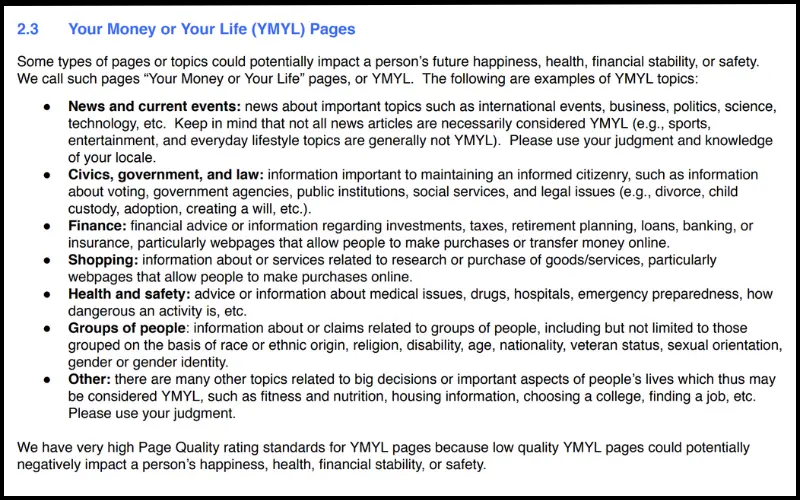
What is E-A-T?
E-A-T- stands for expertise, authoritativeness, and trustworthiness. It comes from Google’s Search Quality Rater Guidelines—a 168-page document used by human quality raters to assess the quality of Google’s search results. Google published this document online in 2013 to “help webmasters understand what Google looks for in a web page.”
Importance of E-A-T
Search Engine Rankings:
E-A-T is a key factor in Google's algorithms for ranking websites. A high level of authority, trustworthiness, and knowledge are indicators of a website's likelihood to rank higher in search results.
User Trust:
E-A-T helps build trust with users. Credible and trustworthy websites have a higher chance of engaging in and keeping visitors.
YMYL Topics:
E-A-T is especially critical for YMYL topics, which include health, finance, and legal advice. For these topics, accuracy and trustworthiness are of utmost importance due to potential real-world consequences.
How E-A-T is Evaluated
1.Expertise:
Example: Mayo Clinic
The Mayo Clinic website is a well-known example of a site with high expertise in the health domain. Medical experts create and review its content, contributing to a strong perception of expertise.
2.Authoritativeness:
Example: Wikipedia
Wikipedia is often considered an authoritative source for a wide range of topics. Its collaborative editing process and the use of citations contribute to its reputation as a reliable information source.
Example: NASA
NASA's website is authoritative in the field of space and astronomy. It is recognized globally as a trustworthy source of information about space exploration and related topics.
3.Trustworthiness:
Example: WebMD
WebMD is a widely recognized health information website that emphasizes trustworthiness. It provides transparent information about the qualifications of its contributors and sources its content from reputable medical professionals.
Example: Consumer Reports
Consumer Reports is known for its trustworthiness in providing unbiased reviews and information about products and services. Its reputation for objectivity enhances its overall trustworthiness.
Characteristics Of High Quality And Low-Quality Pages
Characteristics of High-Quality Pages:
Relevance and Purpose:
- High-quality pages have a clear purpose and provide valuable information relevant to user queries.
- Content aligns with the intent behind search queries and satisfies user needs.
Expertise, Authoritativeness, Trustworthiness (E-A-T):
- Content is created by experts with formal qualifications or real-world experience.
- Authoritative sources are cited, and the overall website is considered trustworthy.
Comprehensive and In-Depth Content:
- High-quality pages often provide in-depth and comprehensive coverage of the topic.
- They go beyond surface-level information to offer valuable insights.
Clear and Accessible Information:
- Content is easily readable, and headings and subheadings help users navigate.
- Information is presented in a clear and organized manner.
High-Quality Main Content (MC):
- The main content of the page is substantial, informative, and valuable.
- It provides a satisfying amount of information to meet user expectations.
Page Design and User Experience:
- High-quality pages have a well-designed layout that enhances the user experience.
- They are mobile-friendly, with easy navigation and a pleasing visual appearance.
Reputation and Positive User Feedback:
- Positive reviews, ratings, and user feedback contribute to the overall reputation of the page and website.
- The website is seen as a reliable and authoritative source.
Characteristics of Low-Quality Pages:
Lack of E-A-T:
- Low-quality pages lack expertise, authoritativeness, and trustworthiness.
- Content is not created by experts, and the overall website is deemed less reliable.
Thin or Shallow Content:
- Low-quality pages may have thin or shallow content that doesn't provide substantial information.
- They may lack depth and fail to address user queries adequately.
Misleading Information:
- Pages that provide inaccurate, misleading, or false information are considered low-quality.
- This is particularly crucial for Your Money or Your Life (YMYL) topics.
Unreliable Sources:
- Low-quality pages may cite unreliable sources or lack proper citations altogether.
- Information is not backed by credible references.
Poor Page Design and User Experience:
- Pages with a poor layout, excessive ads, and a lack of organization may be deemed low-quality.
- A negative impact on user experience can contribute to lower page quality.
Negative Reputation or User Feedback:
- Negative reviews, ratings, or user feedback can indicate a poor reputation.
- Websites with a history of providing low-quality content may have a negative overall perception.
Is E-A-T a Ranking Factor?
E-A-T (Expertise, Authoritativeness, Trustworthiness) is not a direct ranking factor in the sense that Google's algorithms do not have a specific "E-A-T score" that determines a website's position in search results. However, it's essential to understand that E-A-T principles are incorporated into Google's algorithms through various factors. While Google doesn't assign a numerical score to E-A-T, the concepts behind it play a significant role in how the search engine assesses the quality of content and the authority of websites. Here's how E-A-T influences search rankings:
Algorithm Components:
E-A-T is integrated into different components of Google's algorithms, such as the core algorithm and quality algorithms. It's part of a holistic approach to evaluating the overall quality of content and the credibility of websites.
Quality Rater Guidelines:
Google employs human quality raters who assess the quality of search results based on the guidelines provided by Google. E-A-T is explicitly mentioned in these guidelines, and raters use it as a framework to evaluate the relevance and trustworthiness of content.
Indirect Impact on Rankings:
While there isn't a direct E-A-T score, adherence to E-A-T principles can indirectly influence search rankings. Websites that consistently provide high-quality, trustworthy content are more likely to rank well because they align with Google's goal of delivering valuable information to users.
YMYL (Your Money or Your Life) Pages:
E-A-T is particularly crucial for YMYL topics—areas that could impact users' well-being, finances, or safety. Google places a higher emphasis on E-A-T for these topics due to the potential real-world consequences of misinformation.
User Signals:
User engagement and satisfaction are vital factors in Google's algorithms. If a website is perceived as authoritative and trustworthy by users, it may lead to positive user signals such as longer dwell times, lower bounce rates, and higher click-through rates—all of which can indirectly contribute to better rankings.
E-A-T and Your Money or Your Life (YMYL)
Another term that is frequently connected to E-A-T is YMYL, or Your Money or Your Life. Google's QRG also contains the phrase YMYL. Pages that might have an effect on someone's “future happiness, health, financial stability, or safety” are mentioned. News, politics, law, money, health and safety, shopping, details about specific demographics, and guidance on big life decisions—like picking a career path or college—are a few examples of YMYL subjects. You can view additional information about the kind of pages that Google's QRG classifies as YMYL in the screenshot that follows.

So Why Is E-A-T Important for SEO?
Quality Content Ranking:
Google's main objective is to offer users with high-quality, relevant information. E-A-T is a framework that helps Google assess the quality of content. Websites that show knowledge, credibility, and reliability are likely to appear higher in search results.
User Trust and Satisfaction:
E-A-T contributes to building trust with users. When searchers find content from authoritative and trustworthy sources, they are more likely to trust the information. This trust fosters a positive user experience, leading to increased user satisfaction.
YMYL (Your Money or Your Life) Topics:
E-A-T is particularly crucial for YMYL topics, which include areas such as health, finance, and legal advice. Google places a higher emphasis on E-A-T for these topics because the information provided can have a significant impact on users' well-being, safety, and financial stability.
Protection Against Misinformation:
By prioritizing E-A-T, Google aims to protect users from misinformation. Especially in critical areas like health and finance, inaccurate information can have serious consequences. E-A-T helps filter out unreliable sources and promotes trustworthy content.
Competitive Edge:
Websites that invest in E-A-T principles and consistently produce high-quality, authoritative content gain a competitive edge in search rankings. When compared to competitors with lower E-A-T, this may lead to higher visibility, traffic, and engagement.
Adaptation to Algorithm Changes:
Google's algorithms are continually evolving. Prioritizing E-A-T aligns with Google's broader goals and helps websites adapt to algorithm changes. Staying committed to providing quality content positions a website well in the ever-changing landscape of SEO.
Long-Term Sustainability:
E-A-T is not a short-term strategy but a long-term approach to SEO. Websites that consistently focus on expertise, authority, and trustworthiness are more likely to maintain and improve their search rankings over time.
Positive User Signals:
Websites with high E-A-T are likely to generate positive user signals, such as longer dwell times, lower bounce rates, and higher click-through rates. These signals contribute to a positive user experience, which Google values in its ranking algorithms.
Alignment with Google's Mission:
Organizing the world's knowledge and making it widely useful and accessible is Google's purpose. E-A-T aligns with this mission by encouraging websites to provide accurate, valuable information that meets user needs.
Ways to Improve Your Website’s E-A-T
Establish Authorship:
- Clearly identify and showcase the expertise of the individuals creating content on your website. This can include author bylines, author bios, and links to social profiles or professional credentials.
Create Authoritative Content:
- Invest in creating high-quality, authoritative content that provides valuable insights, in-depth analysis, or unique perspectives. Content that demonstrates expertise in your industry or niche is more likely to be considered authoritative.
Highlight Credentials and Expertise:
- Clearly communicate the qualifications, credentials, and expertise of contributors, especially in YMYL (Your Money or Your Life) topics. Include information about relevant education, certifications, and professional experience.
Showcase Testimonials and Endorsements:
- Display testimonials, reviews, or endorsements from satisfied customers, clients, or industry experts. Positive feedback can contribute to the perceived trustworthiness and authority of your website.
Improve Website Design and User Experience:
- Improve your website's overall appearance and user experience. A favourable user experience is enhanced by a well-structured, user-friendly layout, quick page loads, and simple navigation that conveys professionalism and reliability.
Provide Clear Contact Information:
- Make sure your website includes clear and accurate contact information. This is particularly important for YMYL websites. Having a physical address, phone number, and email address adds transparency and credibility.
Regularly Update Content:
- Make sure your content is updated often to keep it updated and right. Outdated information can negatively impact your trustworthiness. Indicate the last update date for pages containing time-sensitive information.
Link to Reliable Sources:
- When creating content, provide links to reputable and authoritative sources that support your information. Citing reliable sources enhances the credibility of your content.
Build Quality Backlinks:
- Obtain backlinks of the highest quality from reputable websites related to your field. Backlinks from reputable sources act as a signal of your website's authority and can positively impact your E-A-T.
Optimize Your About Us Page:
- Strengthen your website's About Us page by providing detailed information about your organization, mission, values, and the expertise of your team. This page is crucial for establishing trust and credibility.
Use Schema Markup:
- Give search engines extra details about the type of content on your websites by using schema markup. This can include information about authors, ratings, and more, enhancing the visibility and understanding of your content.
Address Security Concerns:
- Ensure that your website has secure HTTPS encryption, and take measures to protect user data. A secure website contributes to the overall trustworthiness of your online presence.
Monitor and Manage Online Reputation:
- Actively monitor online reviews, comments, and mentions of your brand. Address negative feedback promptly and encourage positive reviews to build a positive online reputation.
In conclusion, mastering E-A-T (Expertise, Authoritativeness, Trustworthiness) is crucial for SEO success. While not a direct ranking factor, adherence to E-A-T principles significantly influences Google's algorithms, impacting search rankings, user trust, and satisfaction. Particularly vital for Your Money or Your Life (YMYL) topics, E-A-T safeguards users against misinformation. To enhance E-A-T, websites should establish authorship, create authoritative content, highlight credentials, improve user experience, and build quality backlinks. This long-term strategy aligns with Google's mission, ensuring sustained visibility, positive user signals, and resilience to algorithm changes in the dynamic landscape of search engine optimization.

